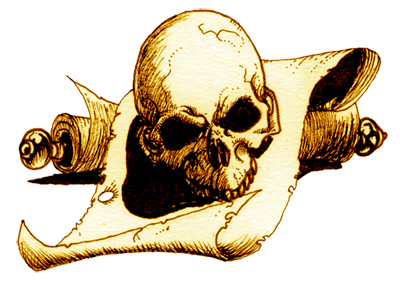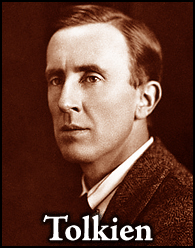The Cimmerian V3n5 — May 2006

Edited by Leo Grin | Illustrated by Dalmatius
40 pages
This issue was printed in two editions. The deluxe edition, numbered 1–75, uses a black linen cover with foil-stamped gold text. The limited edition, numbered 76–225, uses a gold cover with solid black text.
DELUXE COPIES DESTROYED: 19
LIMITED COPIES DESTROYED: 74
Features a symposium on the fortieth anniversary of the release of Conan the Adventurer, the book that spawned the first Howard Boom. Includes a wide-ranging analysis of the Lancer series and its legacy by Gary Romeo, a detailed look at the creation of Frank Frazetta’s Conan covers by Tony Avacato, a reminiscence of Lancer, L. Sprague de Camp and Larry Shaw by Richard Lupoff, a comparison of the current Howard Boom to the historic Lancer boom by Leon Nielsen, poetry by James Ruffini, The Lion’s Den, and more.
EXCERPTS:
The Duillo-illustrated Conan covers appear to have sold more or less just as well as the Frazetta covers. The facts do not bear out the idea that Frazetta alone sold whatever books he illustrated. Books by other authors featuring Frazetta covers — like Phoenix Prime, The Godmakers, Black Emperor, Atlantis Rising and numerous others — were not big sellers. The Jongor series by Robert Moore Williams was not the success that Conan was. Frazetta’s own Death Dealer series and his Sword-and-Sorcery feature film Fire and Ice were only mediocre successes. Even the other Frazetta-illustrated Howard books, Wolfshead and Bran Mak Morn, sold far less than the Conan series. When the mass-market trade paperback of Frazetta art, Icon, was published in 2003, the publishers chose a Conan cover. Despite Frazetta and his fans’ cries to the contrary, the Frazetta covers alone did not make Conan the success it was. This is made clearer when we learn that Frazetta had asked to use the Conan name in conjunction with the sale of his posters — Frazetta knew the Conan name held value. For some reason Frazetta was denied permission, resulting in an acrimony that endures to the present day. In any event, there is clearly more to the success of Conan the Adventurer than just the Frazetta cover.
— from “Viagra for the Soul” by Gary Romeo
Each painting began with a watercolor study. Some of these were well worked out and very specific, others mere suggestions of the final painting. The problems of composition and setting the basic palette were thought through during this stage of the process. From there he would move on to the first stage of the oil painting. This involved a blocking in with either a sepia or umber colored underpainting. This stage, like the subsequent stages, was applied thinly. In fact many of his oil paintings resemble watercolors in their use of thin washes. It was not unusual for Frazetta to wait until the last minute to start a painting, working feverishly through the night so the picture would be ready for sending off to be photographed the next day! To ensure the painting would dry Frazetta would use specific additives called “driers,” i.e. “Cobalt Drier” to accelerate the process. On a few occasions he even went so far as to force-dry a painting by placing it in the kitchen oven! He used whatever materials were available and was not above improvising when the situation dictated. A famous story about Frazetta recalls when, hurrying to meet an impending deadline, he found himself without anything to paint on. As it was too late to go out and buy a canvas or board he decided to improvise and pulled up a piece of flooring and painted on it!
— from “The Lancer Legacy of Frank Frazetta” by Anthony Avacato
One day, we received another letter from L. Sprague de Camp, this one suggesting that Canaveral Press reissue the Conan novels of Robert E. Howard. The two Jacks asked me what I thought of this plan. I told them, frankly, that I didn’t think it would work. The books had been published not very long before by Gnome Press, and it seemed to me that a new edition — even if it involved some shuffling or trimming of the material — would be superfluous. Sprague took this news in good spirits and went looking for another publisher. I can only wonder what would have happened if I had convinced Biblo and Tannen to proceed with the Captain Future project, or if Sprague de Camp had sold us all on the idea of publishing the complete Conan.
— from “Long Ago and Far Away” by Richard Lupoff
Does all this means that we are experiencing a second Howard revival, smaller than the 1970s boom perhaps, yet substantial enough to be considered a resurrection of public interest in the Texas writer? Or is it just wishful thinking by the old guard, and particularly by those enterprising souls who have discovered an opportunity to commercialize Howard’s work anew and profit from the effort? One indicator for gauging a writer’s popularity at any time on a broader level is how well his books or other writings are selling on the general market. Another benchmark is the noted appreciation or depreciation of his published work. Being a bookseller as well as a collector, I have kept an eye on the Howard market for some years. Because it is my business, I need to stay informed of the ups and downs of the market. Without entering into a comprehensive analysis of today’s standing and marketability of Howard’s material, here are some of the more noteworthy observations.
— from “Pseudo Boom” by Leon Nielsen
I have never seen again that blond hair,
Woven with the rays of the Northern sun….
— from “A Vision of Atali” by James Ruffini
We had just completed a marvelous, memorable Café Cenizo brunch at the magnificent Gage Hotel located in isolated Marathon, Texas, some fifty miles north of Big Bend National Park, when my wife Nancy turns and says, “Today might be a nice day to visit that Robert Howard fort you’re always talking about on our way home. It’s not too far out of the way.”
“Yes, it would.” I quickly replied, as actually I’d been thinking about doing exactly that for some time, and had even packed copies of The Cimmerian with articles by Grin and [redacted] in my suitcase just in case this very opportunity presented itself.
So without any further ado, we gathered up Callidog and were motoring at a rapid pace through the isolation of west Texas….
— Jack Jones, writing in The Lion’s Den




